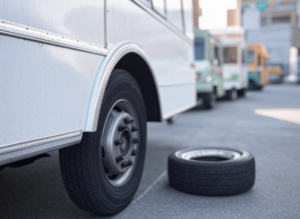For food truck owners, the golden rule is maintenance, maintenance, maintenance. Sure, scouting prime vending spots, perfecting your menu, and nailing your Instagram game matter, but nothing sinks your profits faster than a truck breakdown. A dead generator, a blown tire, or a seized engine doesn’t just cost you repair bills. It costs you customers and momentum. Your food truck is your livelihood, both kitchen and wheels, so a proactive, documented maintenance plan isn’t optional. It’s essential. Let’s break down a detailed, food-truck-specific strategy to keep your rig reliable and your business thriving.
Why Food Truck Maintenance Is Non-Negotiable
A food truck isn’t just a vehicle. It’s a mobile restaurant under constant stress. You’re hauling a loaded kitchen over potholed streets, idling for hours at events, and relying on a generator to power everything from fryers to fridges. Neglect one part, say a worn suspension spring or a clogged exhaust fan, and you’re sidelined, losing a day’s revenue or more.
Regular checks catch small issues before they balloon into emergencies, saving you money and keeping your customers fed. Here’s how to build a tailored, documented maintenance schedule that works.

Does you food truck have a maintenance checklist yet?
Establishing Your Food Truck Maintenance Schedule
Every food truck is unique, diesel or gas, custom-built or retrofitted, propane or electric, so your plan starts with your owner’s manual and generator specs. Pull out those documents, note the recommended service intervals, and build a checklist split into daily, weekly, monthly, and mileage-based tasks. Customize it with the details below, print it out, and stick to it like your secret sauce recipe. This isn’t just busywork. It’s your roadmap to avoiding roadside disasters.
Daily Checks: Your Pre-Shift Routine
Spend 10 minutes before every shift to ensure your truck’s ready to roll. These quick checks prevent surprises mid-day.
- Full Walkaround: Circle your truck with a keen eye. Kick each tire to feel for flats or soft spots. Food trucks carry 5,000 to 10,000 lbs, so tire issues show fast. Check the sidewalls for cuts from curbs (common in tight parking), peek under the chassis for oil drips, and scan the body for new dents or cracks. Look at wheel wells too. Gravel and mud cake up fast.
- Fluid Levels: Lift the hood and check engine oil (via dipstick, should be between the notches), coolant (look at the overflow tank’s min/max lines), brake fluid, and power steering fluid. Food trucks vibrate more than passenger vans, so loose fittings can spring leaks. If oil’s gritty or coolant’s murky, investigate pronto. Top off with the right grades (e.g., 15W-40 for diesel engines).
- Windows and Exterior: Wipe down all windows with glass cleaner. Smudged serving windows turn off customers, and a streaky windshield risks a ticket. Hose off grease splatter from the exhaust vent too. A grimy truck screams neglect. Use a microfiber cloth to avoid scratches.
- Generator Basics: Flip on your generator and listen. Rattles or sputters mean trouble. Check its oil dipstick (keep it full, usually SAE 30 or 10W-30) and glance at the fuel level. A half-empty tank could cut out mid-service.
- Propane Tanks (If Applicable): If you cook with propane, inspect tanks for dents or rust, and sniff for leaks. Propane smells like rotten eggs. Tighten fittings with a wrench and ensure valves are off when parked. A loose connection risks fire.

Inspect your tires regularly.
Weekly Checks: Catch Wear Before It Worsens
Set aside 20 to 30 minutes weekly, say Sunday night, to dig a bit deeper. These checks target parts that degrade with food truck life.
- Belts, Hoses, and Lines: Pop the hood and run your fingers along engine belts. Look for cracks, glazing, or frayed edges. Squeeze hoses for brittleness or bulges. They harden with heat from long idling. Check fuel lines too. Food trucks jostle them loose. In winter, cold shrinks belts, so flex them gently to test. Replace anything suspect. A snapped belt stops you dead.
- Tire Pressure: Grab a digital gauge and check every tire’s PSI against the spec on your truck’s door jamb (often 60 to 80 PSI for commercial tires). Underinflation burns fuel and risks blowouts under heavy loads. Think 8-ply or 10-ply tires rated for 3,000+ lbs each. In heat waves or snow, check twice weekly. Temperature swings mess with pressure.
- Generator Deep Dive: Open the generator compartment and clean debris from the air intake. Street dust loves to clog it. Inspect its belts (cracks mean swap them) and hoses, and tug wires for loose connections. A shaky generator mount (from road vibes) can wear parts faster, so tighten bolts if needed.
- Exhaust Fan: Inside the truck, run your kitchen exhaust fan. Listen for squeaks (needs grease) or weak airflow (clogged filter). Grease buildup on blades is a fire hazard. Wipe them down with degreaser weekly.
Monthly Checks: Invest Time for Longevity
Block off an hour monthly to tackle these tasks. They’re critical for parts that wear slowly but fail big.
- Tire Rotation and Alignment: Rotate tires every 6,000 to 8,000 miles. Fronts wear faster from steering and weight. Jack up the truck (use heavy-duty stands rated for your GVWR), swap tires, and torque lug nuts to spec (usually 100 to 140 ft-lbs for commercial wheels). While under there, eyeball the suspension. Springs and shocks sag under kitchen weight. Book an alignment if steering pulls. Uneven loads skew it fast.
- Wipers and Washer Fluid: Fill the washer tank with a quality fluid (not just water, it freezes or streaks). Test wipers. Replace if they skip or smear. Go for 24-inch heavy-duty blades built for big windshields. Food truck routes mean dusty lots and greasy air. Wipers take a beating.
- Battery Test: Hit an auto parts store for a free voltage test (should read 12.6V+ when off). Food trucks drain batteries with frequent starts, generator pulls, and interior lights. In winter, test bi-monthly. Cold zaps weak cells. Clean terminals with a wire brush if corrosion creeps in.
- Oil Change: Swap engine oil every 5,000 miles or 3 to 6 months. Diesel trucks might need 15W-40, gas ones 5W-30 (check your manual). Replace the filter too. Clogged ones starve the engine. Drain it hot (wear gloves), refill to the dipstick’s full mark, and dispose at a shop.
- Air Filters: Pull the engine and generator filters. Hold them to sunlight. If less than a third is white and see-through, swap them (every 10,000 to 15,000 miles typically). Urban grit and idling clog them fast. Dirty filters choke fuel economy and power.
- Spark Plugs and Wires: Check plugs every 30,000 miles. Unscrew one (cold engine only), and look for black gunk or a gap wider than spec (e.g., 0.035 inches, use a feeler gauge). Replace all if one’s bad. Wires can hit 60,000 miles but swap them together for reliability. Misfires kill your MPG.
- Generator Oil and Filters: Change generator oil every 100 to 200 hours (log runtime). Use SAE 30 or per the manual. Swap its air and fuel filters too. Dirty ones strain the motor. Sync this with your truck’s oil change. Mechanics can handle both and dispose of waste legally.
- Propane System: Pressure-test propane lines with soapy water. Bubbles mean leaks. Check regulator gauges (should hold steady) and clean burner jets with a brush. Carbon buildup cuts efficiency. Swap tanks if rust appears. Safety first.
- Chassis Rust: Crawl under with a flashlight. Check the frame for rust, especially near wheel wells and the kitchen floor (spills seep through). Wire-brush spots and hit them with rust-proof spray. Road salt and wet lots eat steel fast.

You want your truck to last for hundreds of thousands of miles.
Mileage-Based Checks: Big-Picture Care
These are your heavy-hitter maintenance tasks. Tie them to mileage or runtime for precision.
- Tune-Ups: Every 30,000 miles, book a full tune-up. Mechanics test brakes (pads should be 4mm+ thick), transmission (no slipping), and suspension (replace sagging springs). Food trucks haul uneven loads. Don’t skip this, or you’re towing later.
- Brake Inspection: Every 10,000 miles, check pads, rotors, and fluid. City stops wear pads to 2mm in no time. Swap them before metal scrapes metal. Flush brake fluid every 2 years. It absorbs water and weakens.
- Generator Overhaul: Every 500 to 1,000 hours, get a pro to inspect bearings, alternator, and starter. A $200 service beats a $2,000 replacement. Log hours religiously. Guessing risks a mid-shift blackout.
- Transmission Fluid: Check every 30,000 miles. Fluid should be red, not brown or gritty. Swap it per your manual (60,000 miles for some autos). Heavy loads and stop-go traffic cook transmissions. Don’t let it slip.
Documenting Your Maintenance Plan
A schedule’s only as good as your follow-through. Use a spiral notebook, spreadsheet, or app to log every task: date, mileage, generator hours, and notes (e.g., “left rear tire low, added 5 PSI”). This tracks trends (like recurring leaks) and proves care for resale or insurance claims. Here’s how to make it seamless:
- Train Your Team: Show staff how to check tires, fluids, and propane. Use a checklist. It cuts your workload and keeps upkeep humming if you’re sick or slammed. Quiz them monthly to keep skills sharp.
- Stock Supplies: Build an emergency kit: 12-gauge jumper cables, 2 quarts of oil (engine and generator types), coolant, brake fluid, funnel, tire patch kit, flashlight, and a multi-tool set (wrenches, pliers, sockets). Stash it under a bench. Source parts from online wholesalers. Shops mark up filters 50%.
- Kitchen Equipment: List your gear: griddles, fryers, fridges, and check monthly. Grease caster wheels, clean fridge coils (vacuum dust), and test gas valves with soapy water. A $20 fix now beats a $500 replacement later.
- Insurance: Get commercial coverage with roadside assistance, generator repair, and equipment riders. Food trucks face spills, theft, and breakdowns. Generic auto policies won’t cut it.
Essential Maintenance Equipment to Keep On Hand
Even with a solid schedule, breakdowns happen. Tires go flat, batteries die, or a hose splits mid-shift. Keeping the right gear onboard lets you review issues or fix them in a pinch, saving your day. Here’s a curated list of must-have maintenance equipment for food truck owners, tailored to your unique needs:
- Spare Tire and Jack Kit: Carry a full-size spare matched to your truck’s 8-ply or 10-ply tires (check sidewall for size, e.g., LT235/85R16). Include a hydraulic jack rated for your GVWR (often 10,000+ lbs) and a lug wrench. Flats happen. Curbs and nails don’t care about your lunch rush.
- Digital Tire Pressure Gauge: A $15 gauge beats guessing. Aim for 60 to 80 PSI (per your manual). Pair it with a portable air compressor (12V, plugs into your truck’s outlet) to top off tires on-site. Low pressure kills fuel efficiency and risks blowouts.
- Multi-Meter: This $20 tool tests battery voltage (12.6V+ is healthy) and generator output. If your lights dim or the fridge cuts out, it pinpoints electrical gremlins fast. No mechanic required.
- Socket and Wrench Set: A compact set (3/8-inch drive, metric and SAE sizes 8mm-19mm) tackles loose bolts on generator mounts, exhaust fans, or kitchen gear. Food truck vibrations loosen fittings. Tighten them before they fail.
- Propane Leak Detector Spray: A $10 bottle of leak detection fluid (or DIY soapy water in a spray bottle) finds gas leaks. Spray fittings and watch for bubbles. Pair with an adjustable wrench to snug up connections safely.
- Spare Belts and Fuses: Keep one extra serpentine belt for your engine and generator (match part numbers from your manual) and a fuse assortment (10A-30A, common in food truck wiring). A blown fuse or snapped belt can be swapped in 20 minutes roadside.
- LED Work Light: A rechargeable, magnetic light ($25) sticks under the hood or chassis for night repairs. Food trucks don’t always break down in daylight. See what you’re fixing.
- Duct Tape and Zip Ties: Temporary heroes. Tape a split hose or secure a loose wire until you hit a shop. They’re not permanent, but they’ll get you through a shift.
- Portable Fire Extinguisher: Beyond legal requirements, a 5-lb ABC extinguisher handles grease fires or small engine flare-ups. Mount it near the door. Seconds count.
- Oil Absorbent Pads: A pack of $10 pads soaks up spills from a leaky generator or engine. Clean spills fast to avoid fines or slippery floors in your kitchen.
Stash these in a lockable toolbox or under a bench. Label it “Emergency Maintenance” so your crew knows where to look. Test gear monthly (e.g., compressor works, extinguisher’s pressurized) to ensure it’s ready when you need it.
Your food truck isn’t just a ride. It’s your brand, your kitchen, and your paycheck. A detailed, documented maintenance plan keeps it rolling, cooking, and earning. Start now. Dig out your manuals, draft your checklist, and weave these checks into your routine. From the generator humming to the tires gripping, every part matters. Master this, and you’ll outlast the competition, one smooth shift at a time.

Leave A Comment